Key takeaways:
- Touring challenges include physical exhaustion, managing relationships while away, financial uncertainty, and local competition.
- Effective strategies to overcome obstacles involve clear communication, self-care rituals, and collaboration with local artists.
- Personal experiences highlight the importance of camaraderie, community support, and humor in alleviating the stress of touring.
- Maintaining balance between touring and personal life requires prioritizing self-care and making time for meaningful connections.
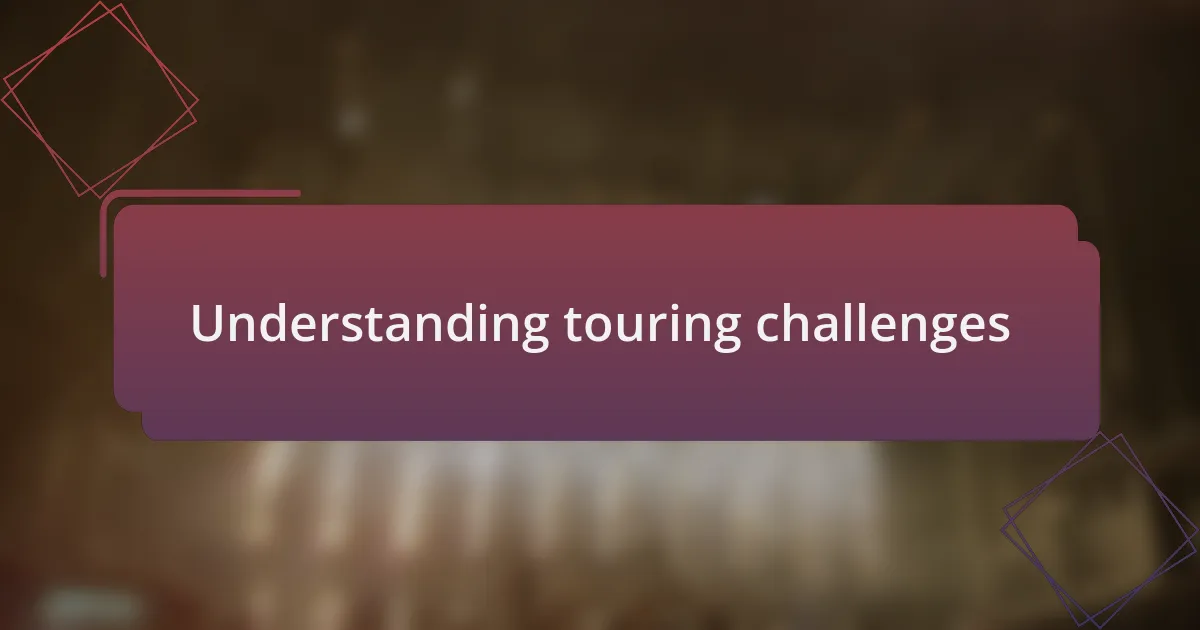
Understanding touring challenges
Touring is often romanticized, but let’s take a moment to unpack the real challenges. I remember my first tour vividly; the excitement was palpable, yet I underestimated the toll it would take on my body and mind. Have you ever found yourself running on empty, craving a good night’s sleep but only getting a few hours on a cramped bus? It’s a tough balance, navigating the thrill of performing with the exhaustion that comes from constant travel.
One of the more perplexing challenges is managing relationships while on the road. Being away from loved ones can create a sense of isolation that I didn’t expect. I often wondered if my connections would falter or strengthen during these long stretches apart. Surprisingly, I found myself leaning on technology—video calls became my lifeline. Yet, the emotional weight of missing significant events back home often left me questioning if the sacrifices were worth the love of music.
Financial uncertainty is another harsh reality that bands face. Have you ever thought about how a single canceled gig can disrupt an entire tour budget? I’ve seen bands struggle to make ends meet, pouring every last dime into their passion. Balancing the need to promote and play while keeping the financial ship afloat requires strategic thinking that can feel like a full-time job in itself. It’s a rollercoaster of highs and lows that teaches resilience like nothing else.
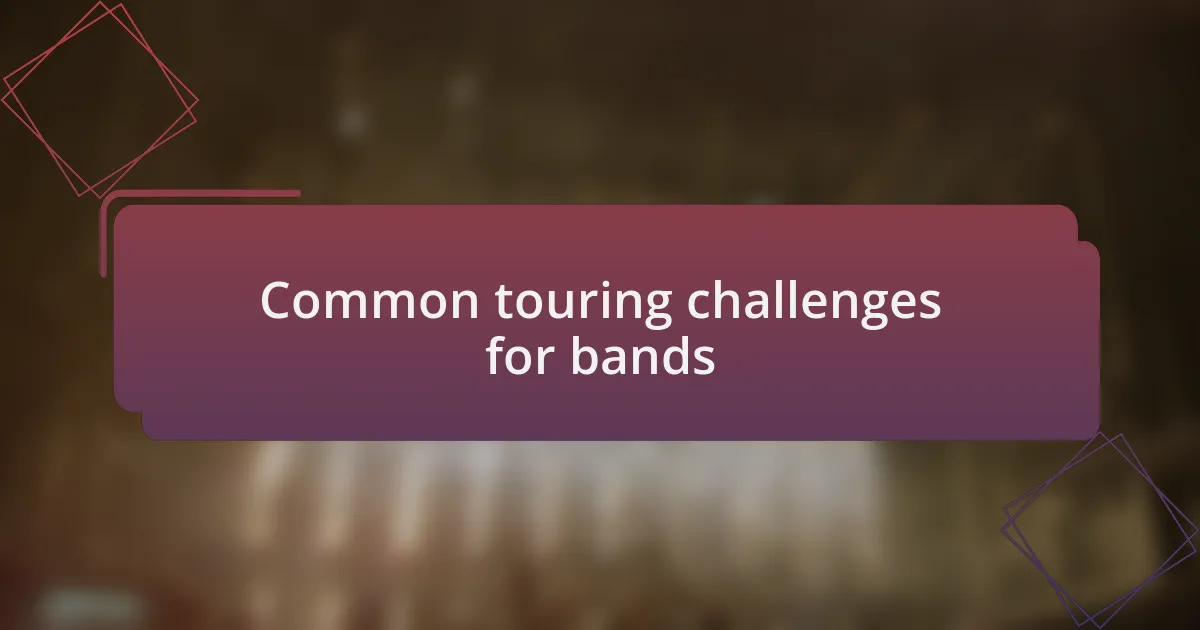
Common touring challenges for bands
Scheduling conflicts can be a nightmare on tour. I recall one tour where we had to juggle last-minute changes to our itinerary, leaving us scrambling to find venues that could accommodate us on short notice. Ever experienced the stress of trying to piece together a show while dodging agents and venue owners? Navigating these logistics often feels like a chaotic dance that tests both patience and teamwork.
Another challenge is the physical and mental strain of endless travel. I can distinctly remember feeling the fatigue seep into my bones, especially after long drives between cities. Have you ever hit that wall where your mind is racing but your body just wants to collapse? This constant state of exhaustion can make it difficult to put on the best performance night after night. It’s a reminder that self-care should always remain a priority, even amidst the hustle.
Lastly, dealing with local competition is something I hadn’t anticipated before touring. I once found myself facing a packed show just a few blocks away featuring a well-known band. Did you ever wonder how to stand out in a city with so many seasoned performers? It can be intimidating, but I’ve learned that building a connection with local audiences and creating memorable experiences can ultimately help carve out our space in an ever-crowded landscape.
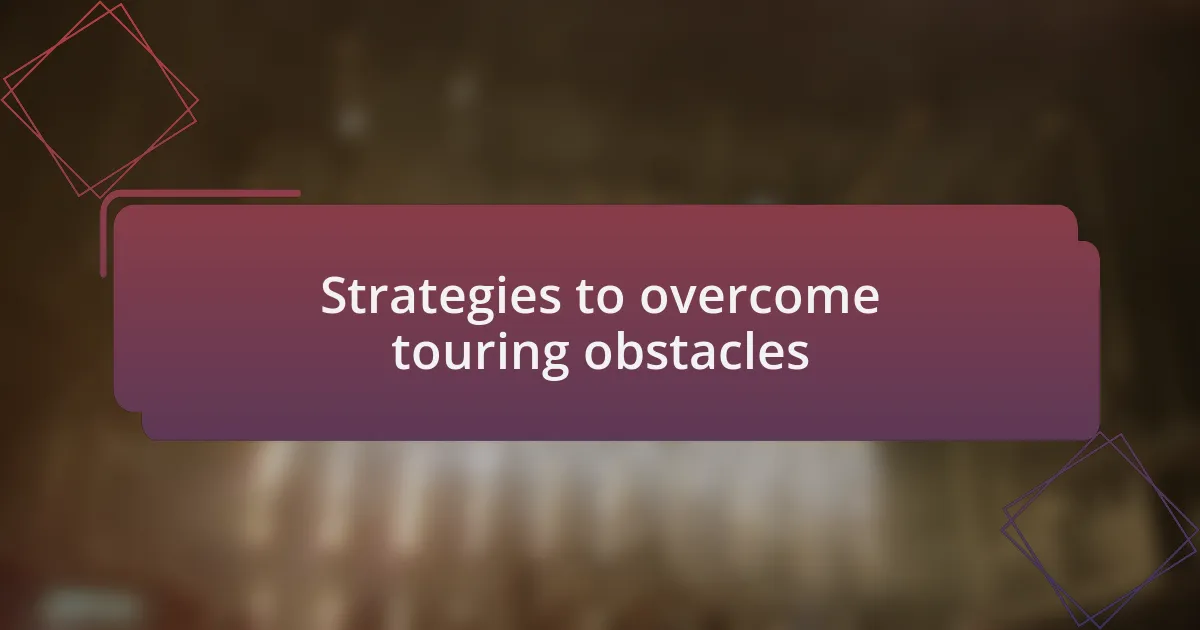
Strategies to overcome touring obstacles
One effective strategy I’ve found to tackle scheduling conflicts is to maintain open lines of communication with all parties involved. During a particularly hectic tour, I started using shared calendars and apps to keep everyone on the same page, which significantly reduced the chaos. Have you ever noticed how much smoother things go when everyone knows what to expect? It’s a game-changer when you’re not scrambling last-minute.
When it comes to managing the physical and mental demands of touring, I’ve discovered that integrating brief self-care rituals can make a world of difference. On one exhausting tour, I began setting aside just 15 minutes for meditation or stretching after shows. This simple practice not only helped me recharge but also improved my focus for the next performance. Have you tried carving out small moments for yourself amid the madness?
Finally, fostering relationships with local bands and fans can turn competition into collaboration. I remember reaching out to a local act and suggesting we do a joint promotion for our shows when we played in the same city. The result? A fantastic turnout and new friendships. Have you ever thought about how collaboration could amplify your reach and impact? Building community is not just beneficial; it’s essential in the metal scene.
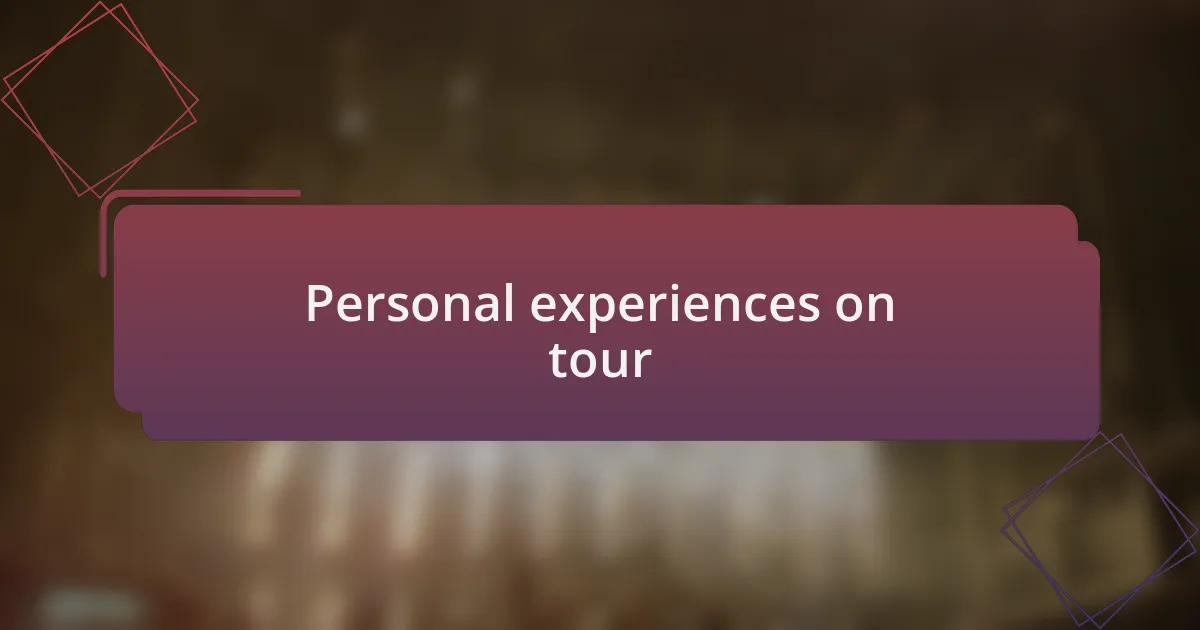
Personal experiences on tour
Whenever I think back to my experiences on tour, one moment stands out. I vividly recall a night in a small town where the venue was buzzing with energy, but our gear had been delayed. While the stress was palpable, I found myself bonding with the crew over shared snacks and jokes in the dim green room. Have you ever experienced that moment of camaraderie that makes all the chaos seem worthwhile?
Another time, after an exhilarating set, I found myself overwhelmed by the post-show adrenaline. There was a slight panic as I realized I had lost my wallet right before meeting fans. The wave of anxiety washed over me, yet amidst the worry, I experienced a profound sense of connection. The fans, noticing my distress, rallied together to help search the venue, and in that instant, I felt an incredible sense of support. Isn’t it crazy how moments like that can showcase the heart of the metal community?
On a lighter note, I remember a particularly long tour where fatigue began to creep in. I decided to flip the mood by starting a silly tradition: every evening, we’d share “tour fails” from the day over dinner. Laughing about forgotten lyrics or minor fails lightened the atmosphere and reminded us that, at the end of the day, it was all part of the journey. How do you think humor can alleviate the weight of touring challenges? From my perspective, it truly has a way of keeping spirits high and the band united.
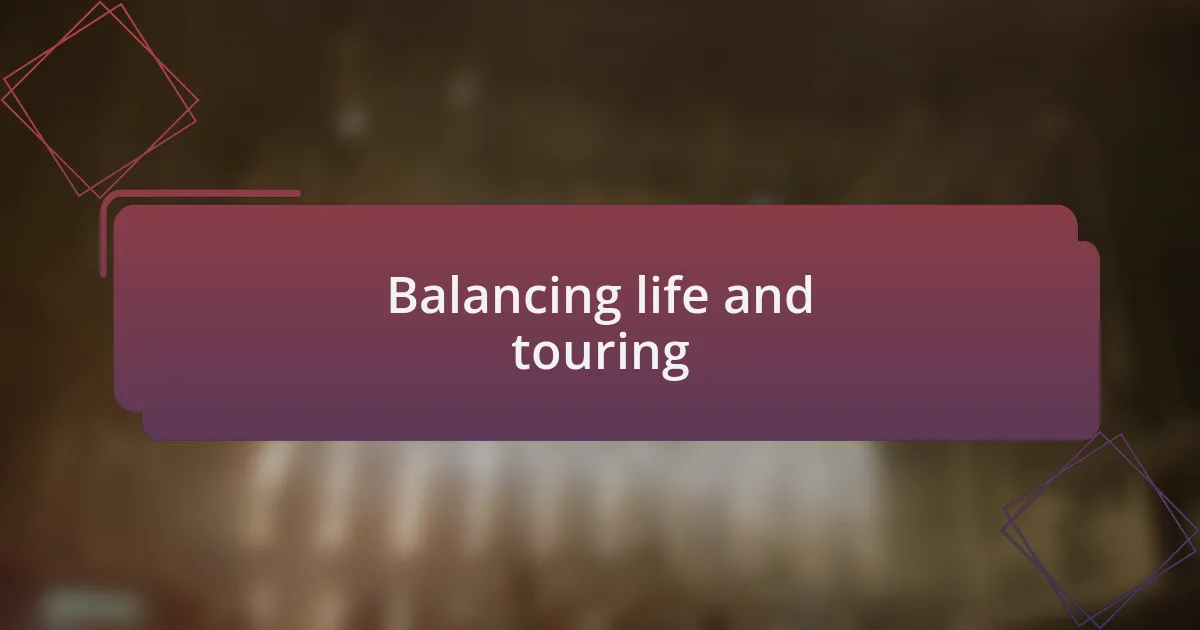
Balancing life and touring
Finding a balance between life and touring is often a tightrope walk. I remember a time when my family organized a reunion during a short break from the road. I desperately wanted to be there, but I also had a show that night miles away. I chose to go, and while it was heartwarming to reconnect, I felt a pang of sadness because I couldn’t fully be present. Have you ever faced a decision that pulled you in two different directions?
The struggle doesn’t end at choosing between family and gigs; it’s about maintaining relationships too. One evening, I found myself chatting with a close friend over video call while sitting in a hotel room. As we exchanged stories, I could sense the distance that touring created—both physically and emotionally. I realized how vital it is to carve out those moments, no matter how fleeting, to keep bonds intact. Isn’t it curious how technology, which can feel limiting while on the road, can also serve as a lifeline?
To truly balance it all, I’ve learned that self-care on the road is non-negotiable. There was a time when I disregarded my mental health during a relentless tour schedule. I felt burnt out and disconnected from both my music and the people I loved. It took me some time to understand that taking small breaks—five minutes to breathe, stretching, or even listening to an album that inspired me—could recharge my spirit. What tiny habits have you found help you reset amidst the chaos?
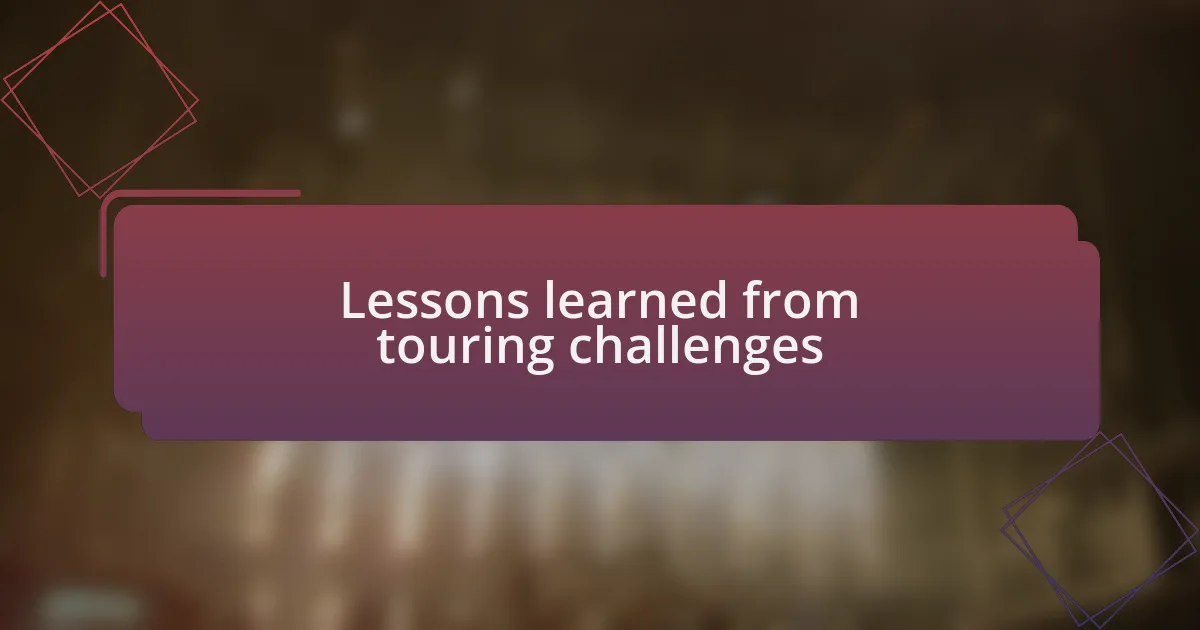
Lessons learned from touring challenges
Touring challenges often teach invaluable lessons about resilience. I remember a particularly grueling stretch on the road where we faced multiple cancellations due to unforeseen circumstances. It was disheartening, but it pushed me to evaluate what truly mattered: the music, the connections we made with fans, and the joy of performing. Have you ever had to shift your focus in difficult times?
I’ve also discovered the power of adaptability during our tours. Last year, we faced a last-minute change in our setlist because of a technical glitch. Instead of panicking, we improvised, and it turned into one of the most memorable shows. That experience reminded me that sometimes the best moments arise from unexpected challenges. Isn’t it fascinating how flexibility can lead to something beautiful?
Moreover, I’ve learned that communication within the band is crucial when facing obstacles. During a challenging tour, misunderstandings began to surface, creating tension. We sat down, laid our feelings bare, and listened to each other. This honesty not only strengthened our bonds but also improved our overall performance on stage. Have you noticed how open dialogue can transform a tough situation into a learning opportunity?